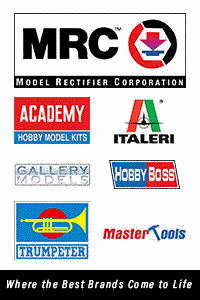
MPC 1/72 Lockheed U-2A Build Review
By Chuck Holte
| Date of Review | June 2017 | Manufacturer | MPC |
|---|---|---|---|
| Subject | Lockheed U-2A | Scale | 1/72 |
| Kit Number | 1-4311 | Primary Media | Styrene |
| Pros | Easy assembly, extra parts for several aircraft options and configurations | Cons | Some warpage on one wing |
| Skill Level | Basic | MSRP (USD) | OOP |
Build Review
The Lockheed U-2 is a single engine, long wing, high altitude reconnaissance aircraft which first entered operational service in 1956. With numerous upgrades, variants and model changes over the years, the current U-2S "Dragon Lady" or "Deuce" continues to provide valuable data to national civilian agencies and the US Department of Defense.
More Dragon Lady information may be found at: NMUSAF U-2 Fact Sheet
The aircraft in this review is one of the early "A" models, US Air Force # 56-6701, and was originally nicknamed "The Saint." It flew with the USAF thunderstorm research program, various operational Recon Wings, and the Central Intelligence Agency. It was converted from an "A" model to a "B" and finally a "C" model configuration. "The Saint" was retired from service in 1982 and now hangs from the rafters in the Strategic Air and Space Museum in Ashland, Nebraska collecting dust vice intelligence data.
I wanted to add a model of the colorful early research aircraft to my collection using the recent Caracal Models U-2 sheet. I selected "6701" in mostly bare metal finish with orange trim as it was when flown by the Air Force Flight Test Center at Edwards AFB, CA in the early 1960s. For the build, I used one of the MPC U-2A/D kits from my stash. I'm told the MPC kit is a re-box of the older Airfix kit with parts to represent a number of U-2 configurations, including the vanilla "A" I wanted. The kit is a simple build with an acceptable cockpit and ejection seat, a one-piece windscreen and canopy which could be easily separated with a razor saw. I chose to save some detailing time and leave the canopy closed.
Parts fit is reasonably good for an older kit and the fine raised panel lines were workable. The starboard wing was slightly warped and needed a little heat persuasion with my wife's blow hair drier. Speaking of wings, the kit provides options for the small slipper tanks/pods, which I did not use, the small underwing maintenance supports, again not used, and the underwing "pogo" taxi supports, which I did use. Once the fuselage, wings and tail were in place, I spent time making sure the seam lines and joints were smooth and polished for the bare metal skin look.
After washing and drying, I used Tamiya rattle can white primer for a foundation coat. Taking advantage of the white primer as an undercoat, I masked and airbrushed the orange panels first using Testor's enamel in the small square bottle. When dry, I removed the masking from the white and masked over the orange for the metal base coat, which was Floquil "Old Silver" thinned and airbrushed over the entire aircraft. Three shades of Alclad II were used to highlight various panels, such as the wing center panels. As usual, the Caracal decals were excellent; thin, strong, in-register and no silvering. Following the decals, I added the landing gear, including the pogos, and antennas. The decals were brushed with Future floor wax, and when dry, I airbrushed a light coat of Floquil Flat to everything shiny except the windscreen/canopy.
The U-2 build was done but I wanted to build one of the "Howdah" sun shades often used to keep the cockpit temperatures to a reasonable range and to provide weather protection when the canopy is open for pilot/maintenance presence in the cockpit. I've added a few photos of the in-progress Howdah, should anyone want to try their hand at one. I started with recycling one of the 5-step work stands from one of the Hasegawa Weapons and Figure sets, and built a framework around it to support the "tent-like" awning above the cockpit. Lots of photos of howdahs on the internet if you search for U-2 photos.
Once again a very enjoyable build of one of the kits that has been ageing for years in my pile of modeling projects. The Caracal decals were the highlight of the build for me and the little Howdah ground support equipment added a little more color to the display. Recommended.























